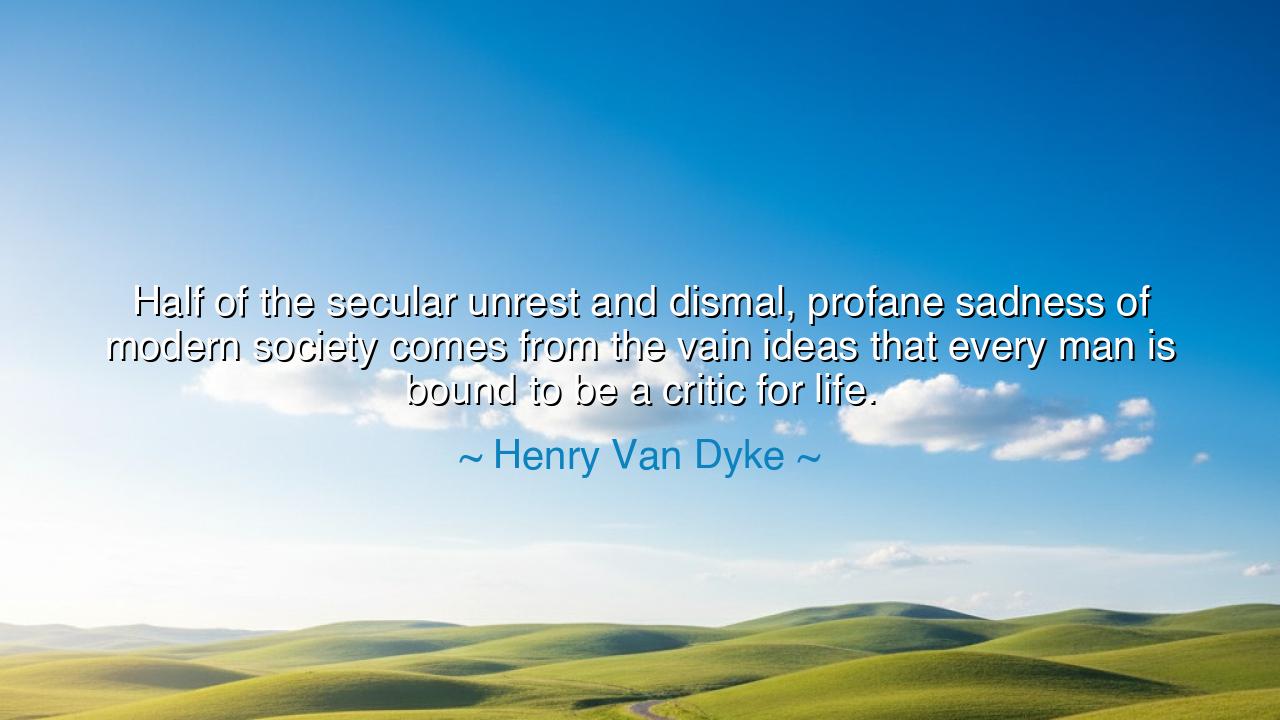
Half of the secular unrest and dismal, profane sadness of modern
Half of the secular unrest and dismal, profane sadness of modern society comes from the vain ideas that every man is bound to be a critic for life.






The poet and sage Henry Van Dyke once declared with piercing clarity: “Half of the secular unrest and dismal, profane sadness of modern society comes from the vain ideas that every man is bound to be a critic for life.” These words, though spoken in another age, strike just as deeply in our own. He warns us that constant criticism—endless fault-finding without creation, labor, or contribution—breeds a society of unrest, dissatisfaction, and sorrow. A man who only critiques and never builds is like a barren tree: full of branches but bearing no fruit.
To be a critic for life is to become a watcher of the labor of others, while never engaging in the noble work of creation or improvement. Van Dyke calls such a state vain, for it inflates the ego with the illusion of wisdom while contributing nothing to the common good. Modern society, he laments, has become consumed by this spirit of critique. Men tear down what others build, scoff at what others attempt, and sneer at what others dare to dream—yet never themselves plant, nurture, or create. This spirit leads not to joy, but to profane sadness, for man was not made to only observe, but to act, to build, to serve.
History confirms this warning. Consider the fate of Athens after its golden age. Once a city of builders, philosophers, dramatists, and warriors, it became a city of critics. Its citizens grew skilled in rhetoric and debate, always dissecting, mocking, and analyzing, but seldom creating or laboring. The glory of Athens waned, for the people had traded action for endless critique. The city that once built the Parthenon and gave birth to democracy crumbled into decline, proving Van Dyke’s point: a society that exalts critics above creators becomes restless, fragile, and sad.
Yet there is another path. Consider Abraham Lincoln, who faced countless critics in his time—mocked for his appearance, ridiculed for his speeches, opposed in his policies. He could have answered them with criticism of his own, yet he chose the harder road: to build. He forged unity where there was division, hope where there was despair, and freedom where there was bondage. His greatness was not in tearing others down, but in lifting a nation up. By acting instead of merely criticizing, he turned sadness into purpose and unrest into renewal.
The meaning of Van Dyke’s words, then, is that true fulfillment comes not from sitting in judgment over others but from engaging in the noble work of life. A man who only critiques never risks, never labors, never bleeds for what he believes. But a man who works, creates, or serves, even imperfectly, is alive in a way the critic can never be. Society thrives on the sweat of its builders, not the scorn of its watchers.
The lesson for us is urgent: resist the temptation to be only a critic. Criticism has its place when it corrects and refines, but it is poison when it becomes a way of life. Do not spend your years dissecting the failures of others while never lifting your hand to contribute. Instead, plant seeds where you stand, mend what is broken, offer your strength to what is good. In this way, you will exchange the sadness of criticism for the joy of creation.
Practical wisdom flows: before criticizing, ask yourself, “What can I build? What can I do to improve what I see?” Take part in your community, give your energy to causes greater than yourself, and learn the humility of labor. Encourage more than you condemn, and if you must critique, let it be from the perspective of one who also acts. For words without deeds are hollow, but deeds with words are power.
So let Van Dyke’s warning echo in your heart: “Every man is not bound to be a critic for life.” Rather, each man is bound to be a builder, a doer, a giver. To spend your life only in judgment is to waste it; to spend it in creation is to sanctify it. Let us not be a society of restless critics, but of courageous builders, leaving behind works that outlast our words.






AAdministratorAdministrator
Welcome, honored guests. Please leave a comment, we will respond soon